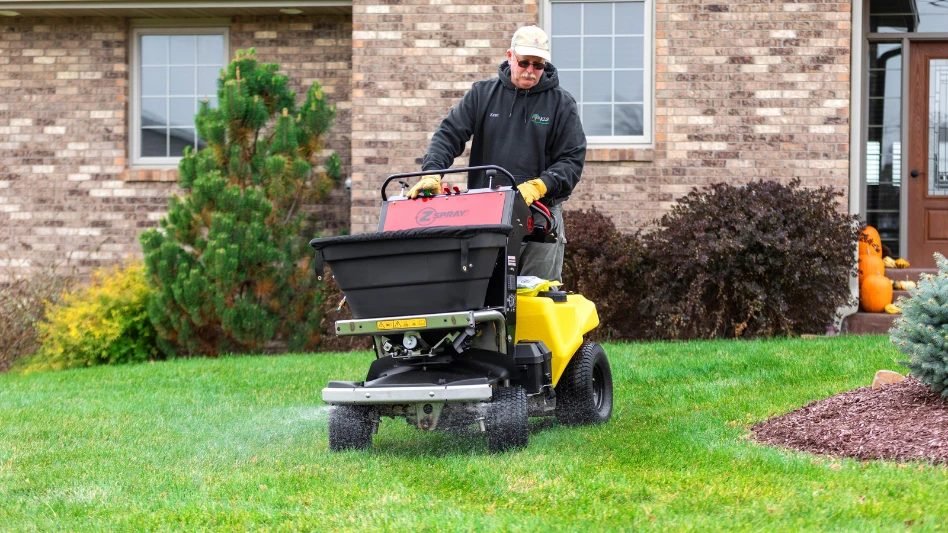
As a child, Laurie Broccolo never dreamed of starting her own lawn care business or becoming the go-to environmental consultant in Rochester, New York. She just knew she wanted to be outside.
Her passion for nature led her to study ornamental horticulture at nearby Finger Lakes Community College. After graduation, she was recruited by a local company, Ted Collins Tree & Landscape, as a tree and shrub technician. As lawn care companies sprouted up during the ’70s, Broccolo spotted opportunity in lawn care and worked with Collins to launch a program.
“I not only started the lawn care program, but I also changed the attitudes of customers and the sales staff by only doing integrated pest management,” Broccolo says. “It was perfect timing, because there was an explosion about pesticide concerns in the mid-80s.”
Broccolo began establishing her reputation around IPM, which her website defines as “combining chemical treatments, cultural practices, and biological controls to manage pests.” She got involved in what was then the Professional Lawn Care Association of America and served as the first president of the New York State Lawn Care Association. As she worked her way up the company to vice president, she leveraged her position in the industry to educate people about more sustainable ways of managing lawns and landscapes.
When Collins sold the business, Broccolo decided to apply what he taught her by starting her own company, Broccolo Tree and Lawn Care, in 1990. With IPM lawn and tree care as its focus, the company added new staff and capabilities as clients requested more services. As environmental consciousness has continued expanding, so has Broccolo’s business.

Rise of environmental work.
Stormwater management regulations drive Broccolo’s environmental work. It started in 2005 when a local developer, who knew about the firm’s environmental focus through the Chamber of Commerce, asked Broccolo to bid on a wetland protection project that involved the Army Corps of Engineers and the Department of Environmental Conservation. The development required moving a DEC-protected creek to carry stormwater off-placement from the construction site.
“They chose us because we were the only ones that were passionately concerned about the environment and had already taught DEC classes for IPM and pesticide certification,” Broccolo says.
Broccolo worked with a civil engineer, who designed multiple storm check dams with jute mesh – items she had never installed before.

“Everything was going really well – and then, Hurricane Katrina came through,” she says. “The stormwater surge was so intense that it blew out every single check dam, and got to the last line of defense of silt fence. Because of the way we had installed all the storm detention dams and plantings, no silt from the construction site ended up in the protected wetlands.”
That project established Broccolo’s reputation for wetland installations and other stormwater management projects like swales, rain gardens and green roofs. The first company in Rochester to become certified green roof installers, Broccolo held green roof workshops at her home to educate architects and engineers – which helped build more relationships, resulting in more work.
Environmental projects still represent a huge growth opportunity for Broccolo – not just on the commercial side, but also for residential clients, who account for 80 percent of the business. Though “residential lawn care is still our bread and butter,” Broccolo says, “we’re not seeing big growth in that area. We are seeing big growth, though, in the design and installation of pollinator gardens, rain gardens, meadows and residential landscaping projects with an environmental focus.”
Retail destination.
The more environmental projects that Broccolo bid on, and the more plantings that were involved, the less competitive and less profitable the company became – especially when bidding against larger landscapers with access to cheaper materials.
“I wasn’t getting projects because, with my plant costs, I could not compete with landscape contractors that had their own nurseries,” Broccolo says.
So, in 2011, she decided to purchase a garden center to supply her plant needs. She’d been buying materials there for years when the owners asked her to be their exit plan from the business, agreeing to stay on board for a year to teach her retail.
Initially, the biggest perk of owning a garden center was “being able to sell wholesale to ourselves,” she says. Within a year of opening Broccolo Garden Center, Broccolo became more competitive and profitable with commercial installations.
Now, Broccolo is focusing more on the retail potential of the garden center, with the goal of making it an educational eco-agritourism destination with classes and events. The garden center sits on a 40-acre farm, with about three acres dedicated to growing nursery stock, surrounded by woods and farmland.
Last year Broccolo enhanced the landscaping around the barn (which was built in 1900) and added a screened-in butterfly garden, green roof and chicken coop. A local beekeeper also maintains hives on the property, where pollinators thrive in a half-acre of wildflower meadows. At a grand opening last August, Broccolo invited people to explore the gardens via walkways made of recycled tires and permeable turf stone pathways – showcasing Broccolo Tree and Lawn Care’s sustainable landscape installations. Next, the company is installing small orchards as examples of edible plantings that customers can replicate at home.

Broccolo hosts engineers, architects and other local businesses at the farm. The local Chamber of Commerce holds a tour and luncheon there every summer. Groups from schools, clubs and other organizations are also coming out to learn about stormwater management, pollinators and other aspects of sustainable landscaping.
These classes, luncheons and events are “what’s really bringing in retail customers,” Broccolo says. “We want people to be immersed in the gardens and displays and, obviously, buy something on their way out.”
Retail customers directly benefit the other side of the business, too. Last year, “garden center leads brought in $60,000 worth of lawn care programs and landscape projects,” Broccolo says. “That, by itself, is worth it.”
Broccolo’s gross revenue exceeds $3.5 million – including $1.5 million in IPM lawn and tree care, $1.8 million in landscaping construction and maintenance, and half a million from the garden center. As she shifts more attention toward retail, Broccolo predicts even more growth.
“I’m doing more within the garden center and having fun with the community outreach. What a great way to blend learning about the environment and socializing with my customers,” Broccolo says. “As the business continues to grow in all the other areas, it’s allowing me to continue to learn and be challenged in different ways – always with that environmental focus.”
Get curated news on YOUR industry.
Enter your email to receive our newsletters.
Explore the February 2018 Issue
Check out more from this issue and find your next story to read.
Latest from Lawn & Landscape
- PERC helps debut propane direct-injection fuel system at ACT Expo 2025
- Retargeting Ads – A Secret Weapon for Growing Your Lawn Care Business
- Leading a growing company
- Project EverGreen launches Clean Air Calculator
- Rain Bird acquires smart lawn care company OtO from Toronto
- PBI-Gordon names Marvin as VP of research and development
- Mean Green rolls out Vanquish Autonomous mower
- Focal Pointe launches new podcast series







